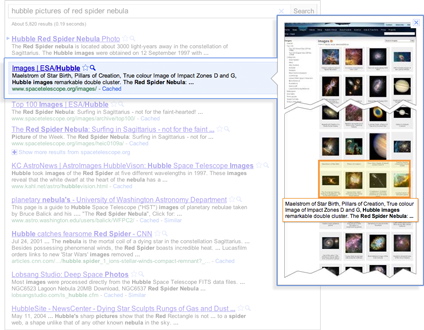
Google Instant Preview: making linked pages visible improves search
Google on Tuesday announced yet another upgrade to its search results pages intended to provide more information so that users don't haphazardly click away: Instant Previews. These previews are as simple as a small magnifying glass icon next to a search result, which users can click upon to see a visual snapshot of the linked site. These snapshots may also include search terms highlighted in orange where they appear in the resulting page. That's about it.
It's an understandable concept, and Google said on Tuesday that the feature increased users' satisfaction with search results by about 5% in internal testing.

Blekko, the 'crowdsourced' search engine launches in beta
ComScore's most recent qSearch Web search market share analysis gave Google 66% of the core search business, with the closest competitor, Yahoo trailing by 50%.
Of the more than 16 billion explicit core searches conducted in September, Google handled 10.6 billion of them. Yahoo sites handled 2.7 billion, Microsoft sites took care of 1.8 billion, Ask Network fielded 593 million, and AOL sites took 362 million.

Hotmail becomes 'Web-based Outlook,' sends email from other POP services
Today, Windows Live Hotmail users will begin to be able to send email from other existing email addresses while using Hotmail.
In the Hotmail Options menu under the heading "Sending/Receiving email from other accounts," users can add their other webmail addresses, and then use hotmail to send and receive messages.

Mint Data opens in beta, lets users check how their local economy is doing
Mint.com today has rolled out the beta of a new service called Mint Data that takes the tons of anonymous shopping data it receives, and turns it into a searchable database of retailers. Similar to the way Amazon's Alexa categorizes the popularity of a website by its unique visitors, total views, and inbound links, Mint Data ranks a retailer's popularity by the average purchase price and number of purchases per month.
The information comes from the anonymous spending data of the more than 4 million Mint users, and Mint breaks it down into which categories people are spending their money on (such as food, dining, entertainment, etc,) the specific businesses that they're patronizing, and the city in which they're spending their money.

MySpace looks to refocus with entertainment-centric redesign
Having all but lost the social networking war, MySpace on Wednesday decided to lean on one of the few areas where it still has a good deal of clout: entertainment. The newly redesigned MySpace focuses less on the "friends" aspect it pioneered in the space, and more on sharing videos, music, and games with friends.
The site says it wants to become a "social entertainment destination" for the Generation 'Y' crowd. CEO Mike Jones said that the move marked a complete change in strategy for the company, and focused on its existing strengths. This change may also be the last best hope for the site given how far it has fallen.

Mozilla unveils prototype cross-platform Web app store
Software company Mozilla on Tuesday unveiled its plans for Open Web App stores for distributing, selling, and managing rich Internet applications built in HTML, CSS, and JavaScript.
Mozilla's concept is similar to the Chrome app store Google discussed when it first unveiled Chrome OS one year ago, but it is meant to use only browser-native functions that can be accessed just as easily on a PC as on a mobile device.

Facebook admits its third-party developers have mishandled private data
In what could be potentially damaging to a company already being criticized over its privacy issues, Facebook admitted late Sunday that it had knowledge of developers passing information called user IDs within applications. The user ID is a unique set of numbers that identify users on the site.
Facebook engineer Mike Vernal said in a blog post that in most cases the company believed developers were doing this unintentionally, but regardless it was a violation of the social networking site's privacy policy. Vernal did however say the press was overblowing the situation.

Audiogalaxy 2.0 launches in beta after 8-year dormancy
Audiogalaxy is back. But it's not the same service you knew a decade ago.
Audiogalaxy was one of the most elegant peer-to-peer filesharing services of the early 2000's, pairing a robust P2P client with a Web-based search and indexing system that made Napster look sloppy by comparison.

Borders targets bloggers with new e-book publishing platform
Following last week's debut of "Kindle Singles," a new shorter-form publishing format exclusively for Amazon's Kindle e-reader, book retailer Borders has announced its own blogger-centric e-reader publishing platform called "Borders -- Get Published."
Powered by BookBrewer, "Get Published" will let independent authors publish and sell their e-books through the Borders e-book store in a quick and easy fashion. Borders is specifically targeting bloggers with this service, promising "Blog to e-book in 10 minutes."

Bing will use your Facebook friends to personalize search results
Microsoft and Facebook Wednesday unveiled some new search tools for Bing which integrate data from a user's circle of friends into Bing's search results.
In the Bing blog on Wednesday, Microsoft Senior Vice President of online services Satya Nadella said 50% of users consider their friends' opinions when making a decision online. Bing is trying to capitalize on this by incorporating the "likes" of a user's friend list into search results.

GMail "Conversation View" to become an option
One of the signature features of Google's Gmail e-mail service is about to become optional. The company said Wednesday that over the next few days it would allow its users to turn off "conversation view," which organizes e-mail threads onto a single page for easier viewing.
Technical lead Wiltse Carpenter said the move was aimed at drawing in users who may be passing up Gmail because of their dislike for the way it formats your inbox. "The way Gmail organizes mail into conversations is like cilantro," he quipped. "You either love it ... or you hate it."

Windows Live Spaces shutting down, WordPress.com takes on users
Microsoft's blogging platform Windows Live Spaces is being decommissioned, and the users are being absorbed by WordPress.com, Microsoft and Automattic Inc. announced on Monday.
Beginning today, Windows Live Spaces users have the option to automatically migrate their entire blog over to WordPress.com when they sign up to create a new WordPress blog, otherwise their content will be removed from Windows Live Spaces when it shuts down in six months.

Facebook Goes Down
While outages have become an expected part of the Twitter experience, social network Facebook has a pretty good reputation for staying available. Beginning on Wednesday evening, and carrying over into Thursday, the site experienced rare outages that affected not only the main Facebook.com site, but also the elements of Facebook that are shared among other sites, such as the ubiquitous "Like" button.
In addition to API latency issues mentioned on the Facebook Platform site, a statement from Facebook on Thursday said:

Microsoft Office Web Apps launches embeddable PPT and XL documents, new features, availability
Microsoft's suite of free, browser-based productivity tools called Office Web Apps received a handful of feature upgrades today, which don't act as substitutes for desktop Office functionality, but instead bring Office documents out onto the Web.
As of right now, Office Web Apps users can embed Powerpoint presentations and Excel spreadsheets in blogs and websites via the PowerPoint and Excel mini Web apps. Below, I've embedded Microsoft's example Powerpoint slideshow, which shows the relatively simple process of uploading a .PPT file to SkyDrive, setting permissions, and embedding it. Clicking on the "full screen" icon in the lower right hand corner opens the full version of the PowerPoint Web app, and with appropriate permissions, users can edit the presentation and automatically update it while it's on the Web.

Google introduces two-step authentication for Apps product
Google on Monday announced that it would offer a two-step security option to certain customers of its Google Apps product, aiming to offer its customers a low cost option for higher security. The new authentication system would combine the traditional password with a verification code sent to the user's mobile phone.
Initially the offering would be available to English users of its Premier, Education and Government editions, with Standard edition customers getting the feature in the coming months. Google wants to ensure they can scale the feature reliability before expanding it to the "hundreds of millions" using the free version.
